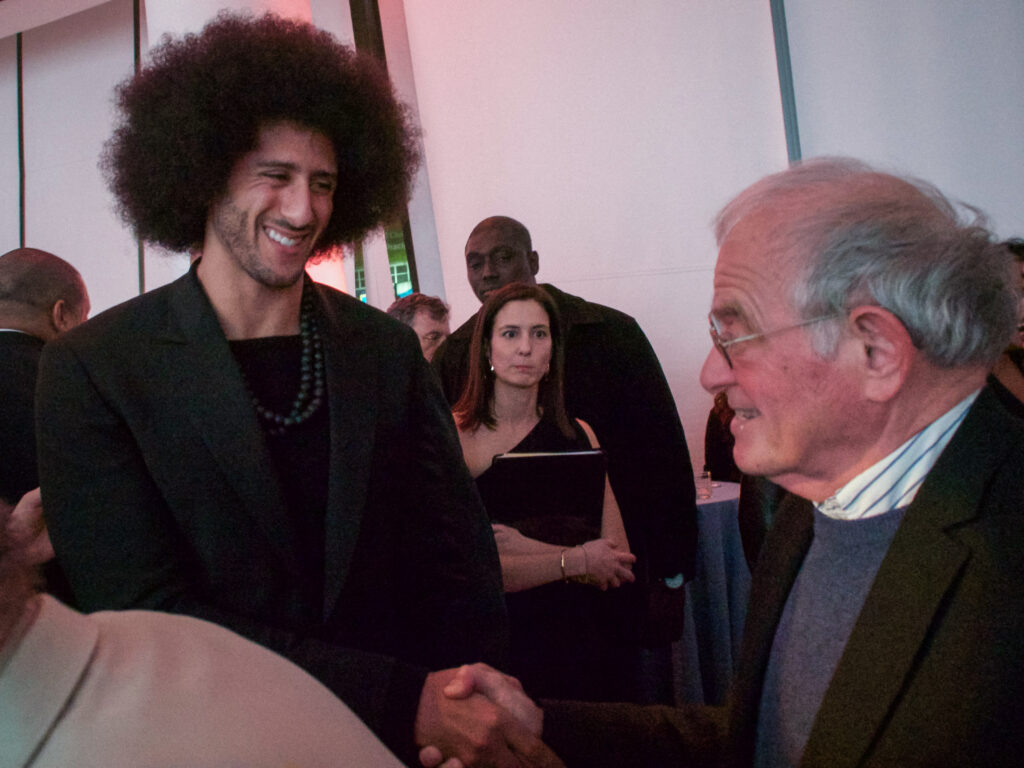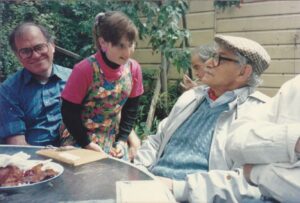Peter Carroll: Tributes
ALBA Before and After Peter
By Daniel Czitrom
The 1992 annual ALBA Board meeting promised to be tense—and it was. The main agenda item involved a proposal to spend $4,000 to send Peter Carroll, who had recently joined the Board, to Moscow for research into the newly opened Russian Archives. The records of the International Brigades had been sent to Moscow just before the Republic’s collapse in 1939, where they had gathered dust for a half-century. Peter was just completing his landmark history, The Odyssey of the Abraham Lincoln Brigade, and his trip would also explore the possibility of ALBA retrieving the long-lost records of American volunteers in Spain. The ALBA Board at the time included numerous vets, some of whom expressed strong doubts about funding Peter’s trip. Perhaps they feared what might be found within those records—negative evaluations, records of desertions, expressions of long-abandoned political views— but none of these were ever expressed openly during debate. Some thought the $4,000 was way out of line with ALBA’s budget and its previous expenditures. In the end, those of us who stressed ALBA’s obligation to gather, preserve, and disseminate the history of American volunteers in Spain won out. Peter made his trip, and it marked a critical turning point for ALBA.
When Steve Nelson, national commander of the Veterans of the Lincoln Brigade (VALB) invited me to join the Board in 1986, ALBA was a small, underfunded organization, still largely dominated by a handful of Lincoln veterans. We had no endowment, no full-time staffer, and no clear mission beyond preserving the Lincolns’ historical legacy. We were insular, focused mostly on encouraging donations to the ALBA collection (then housed at Brandeis University), and communicating with long-time friends and supporters of (VALB). As we tried moving ALBA toward greater visibility and more secure funding, I can still recall our contentious debate in 1988 over whether we needed an executive director. We hired Danny Duncan Collum that year as our first ED, for the princely salary of $15,000, another important step in ALBA’s coming of age.
In 1994, after a four-year stint, and just starting a family, I stepped down from chairing the ALBA Board of Governors. My successor was Peter Carroll. He has been the driving force behind the growth and expansion that ALBA has enjoyed over the past 25 years. His leadership transformed ALBA in so many ways. His work with the Puffin Foundation led to a large teaching grant and the annual Puffin-ALBA Human Rights Award, first given in 2011. His careful attention to fundraising, within the vet community and elsewhere, created a substantial endowment for the first time. Peter also led creation of our Teacher Institutes, the single most effective program we have for educating students and teachers on all aspects of the Lincolns’ history and its continuing relevance in today’s world. His helped create the San Francisco Monument to the Lincoln Brigade in 2008, and his energy today has led to its restoration and rededication after years of neglect. His work editing The Volunteer continues to this day. And his landmark 1994 book, The Odyssey of the Abraham Lincoln Brigade, so deeply researched and thoughtfully written, remains the single best history of Americans in the Spanish Civil War.
Peter will be the first to tell you that all his ALBA work has been deeply collaborative, and that our growth has also depended upon the contributions of many Board members, past and present. Yet his leadership has been the key. We are deeply grateful for Peter’s outstanding commitment, persistence, and vision through all these years.
Brief Tributes

At the Nation Dinner with Colin Kaepernick, winner of the 2017 Puffin/Nation Prize for Creative Citizenship.
For more than two decades Peter’s wisdom, friendship, and historical insights have aided The Puffin Foundation and our mission in countless ways. He serves as the Chair for the Puffin Gallery of Social Activism’s advisory board at the Museum of the City of NY, sits on the committee to choose the annual Puffin Prize for Creative Citizenship, and chairs Puffin’s own Advisory Board. But most importantly, Peter is always being there to offer sage advice, suggestions, and of course always an outstanding a poem.
—Gladys and Neal Rosenstein
I first became aware of Peter Carroll when his book on the American Lincoln battalion hit my desk in 1994. Prior to that moment, there were plenty of books on volunteers from all countries including the USA but not until then an entirely satisfactory account of the role of Americans in Spain. Peter Carroll’s book immediately became the go-to source because of his thorough trawling through all available sources and the sensitive way in which he dealt with it. To the copious material available at Brandeis University and the Hoover Institution, he added the comprehensive Brigade documentation held in Moscow. Even more profitably, he interviewed a large number of survivors who not only gave him frank interviews but also large amounts of documentary material. The quotations from these interviews and letters gave his book an extraordinary emotional force. Nevertheless, despite his empathy with the volunteers and their cause, Carroll managed to assess the evidence critically and impartially.
The consequence was a deeply humane, intensely moving, but completely reliable work about the experience of the volunteers which remains as important today as it was in 1994. It is a book teeming with revelations yet perhaps its most original feature is that it is a book not just about about the Spanish Civil War but also about American radicalism—on which Peter is an expert and of which he is a great example. Reading that book was the beginning of a near thirty-year friendship. As we met frequently in London and in San Francisco, I learned that he is not only a learned scholar but also a terrific human being, always fun to be with and always dispensing knowledge and insight along with humor.
—Paul Preston
I first “met” Peter Carroll. through the Odyssey and later got in touch with him about my own related research. He’s always been an unstintingly generous and thoughtful source of scholarly support.
The Odyssey, to which I have returned time and again over the years, is still the standard work on the Lincoln volunteers. Not only for its meticulous and exhaustive historical scholarship, but also because it traces the whole arc of the brigaders’ biographies, from the Great Depression and the war in Spain to their lives of resistance and activism in Cold War America. It is a shining model of holistic history writing. Peter tells with a humane, yet forensic eye—and with a radical poet’s grace—how the vast repressive weight of the Cold War at the heart of the “free West” irrupted into real human lives.
The stakes in understanding the Lincolns’ story have only become greater today, as the inhospitable political and economic order that is now inheriting Western Cold War legitimacy continues self-interestedly to “unsee” the significance and potential of Spain’s democratic Republic and of the international volunteers who defended it. It’s hard to overstate the importance of Peter’s book as a powerful counterweight to that “unseeing.” For me personally, the Odyssey is one of a core set of “luminous” books I’ve read over my life as a historian—books whose after-image lives on in the mind to assist and enrich the collective challenge to us all: to keep producing critically engaged history, lucidly told. Thank you, Peter.
—Helen Graham
We heard their stories: Abe, Milt, Moishe, Bill, Abie Smorodin, George Watt, Ginny Malbin, Bill Bailey, so many others—Jarama, Belchite, the Ebro… Ordinary people who did extraordinary things, and you wrote their stories. Thanks to your vision and leadership, ALBA grew, and their legacy lives on. Gracias, Peter. ¡Salud, camarada!
—Anthony L. Geist
The happy surprise of hearing “I would like to give some money” must have taken aback whomever answered the telephone that day at ALBA. I was calling in my role as Executor of the Alger and Isabel Hiss Estate. I had found my way to ALBA through an old friend and fellow political activist, Victor Navasky, then-Editor in Chief of The Nation. The person at the other end of the phone must have taken my name and number and that was that—until I received a call back from Peter Carroll.
Thus began both my long relationship with Peter, and, as a Board Member, with ALBA. Peter’s tremendous enthusiasm for ALBA showed from the moment I met him. Through conversations with this interesting man with a New York accent I discovered the sad truth that without the help of the United States, France and England, Franco could not be defeated. These many years later I am grateful to be in the position of being able to give a donation in my own name so that Peter may continue his work passing on his tremendous knowledge and passion to teachers throughout the United States and beyond.
—Ellyn Polshek
To Peter Carroll, poet
Poetry is something more scientific and serious than history
—Aristotle
First we undo the knots in the massive rope of history.
Then we unbraid the rope itself,
teasing apart the strands of lived experience.
We later display handy lengths of single spindly filaments
as if they were somehow history or life itself.
Painting, here; photography, over there;
sculpture, someplace out of the way lest we bump into it.
Pamphlets and posters, somewhere else yet (as far away as possible from the serious stuff, please)
Magazines, in the flea market, or recycling bin.
Poetry? Poetry?
Isolate and archive separately all the fluids and flows of life itself.
Tuck away all the books in the stacks, like so many dead
in their call-numbered niches.
Sacco and Vanzetti? In the KF section, sixth level.
Emmet Till? E section, third level.
Leo Frank? DS section, second level.
Oliver Law? Off-site. You’re in the wrong cemetery.
Or are you?
—James D. Fernández













